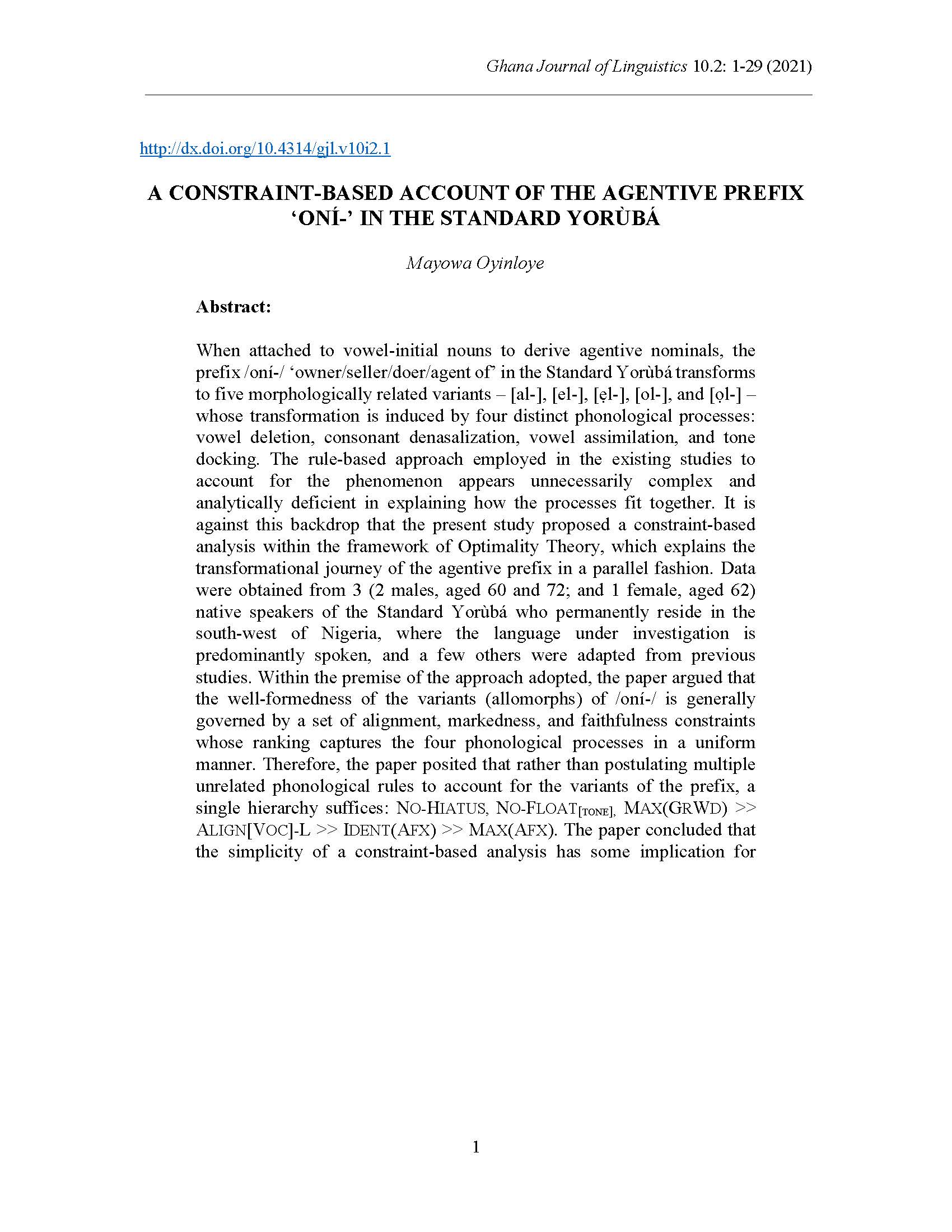A Constraint-Based Account of the Agentive Prefix ‘oní-’ in the Standard Yorùbá
DOI:
https://doi.org/10.4314/gjl.v10i2.450Keywords:
Keywords: Agentive prefix /oní-/, Standard Yorùbá, Generative Phonology, Optimality Theory, Language PedagogyAbstract
When attached to vowel-initial nouns to derive agentive nominals, the prefix /oní-/ ‘owner/seller/doer/agent of’ in the Standard Yorùbá transforms to five morphologically related variants ‒ [al-], [el-], [ẹl-], [ol-], and [ọl-] ‒ whose transformation is induced by four distinct phonological processes: vowel deletion, consonant denasalization, vowel assimilation, and tone docking. The rule-based approach employed heretofore in the existing studies to account for the phenomenon appears unnecessarily complex and analytically deficient in explaining how the processes fit together. It is against this backdrop that the present study proposed a constraint-based analysis within the framework of Optimality Theory, which explains the transformational journey of the agentive prefix in a parallel fashion. The majority of the data were supplied by the researcher, being a native speaker of the language, while the rest were reproduced from the extant literature. Within the premise of the approach adopted, the paper argued that the well-formedness of the variants (allomorphs) of /oní-/ is generally governed by a set of alignment, markedness, and faithfulness constraints whose ranking uniformly and straightforwardly captures the four phonological processes. Therefore, the paper contended that rather than postulating multiple unrelated phonological rules to account for the variants of the prefix, a single hierarchy suffices: NO-HIATUS, NO-FLOAT[TONE], MAX(GRWD) >> ALIGN[VOC]-L >> IDENT(AFX) >> MAX(AFX). The paper concluded that the simplicity of a constraint-based analysis has some implication for language pedagogy in terms of learnability: a simple grammar is easier to learn than a complex one.
References
Adewole, Stephen Monday. 1995. Yoruba Word Formation Processes. PhD Dissertation, University of California, Los Angeles.
Akinlabi, Akinbiyi. 1996. “Featural Affixation.” Journal of Linguistics 32: 239-89.
Akinlabi, Akinbiyi and Francis Oyebade. 1987. “Lexical and Post-lexical Rule Application: Vowel Deletion in Yoruba.” Journal of West African Languages 17 (2): 23-41.
Archangeli, Diana. 1999. “Introducing Optimality Theory.” Annual Review of Anthropology 28: 531-552. http://www.jstor.org/stable/223405
Arokoyo, Bolanle Elizabeth. 2017. Unlocking Morphology (2nd edn.). Ilorin: Chridamel.
Awobuluyi, Oladele. 1967. “Vowel and Consonant Harmony in Yoruba.” Journal of West African Languages 6 (1): 1-8.
Awobuluyi, Oladele. 2008. Ẹ̀kọ́ Ìṣẹ̀dá-Ọ̀rọ̀ Yorùbá. Àkúrẹ́: Montem Paperbacks.
Awobuluyi, Oladele and Francis Oyebade. 1995. “Denasalization in Yoruba: A Non-linear Approach.” In Language in Nigeria: Essays in Honour of Ayo Bamgbose, edited by K. Owolabi, 16-31. Ibadan: Group Publishers.
Bámgbóṣé, Ayọ̀. 1963. A Study of Structures and Clauses in the Grammar of Modern Yoruba. Doctoral Dissertation, Edinburgh University, Edinburgh.
Bámgbóṣé, Ayọ̀. 1986. “Yoruba: A Language in Transition.” In J. F. Odunjo memorial lectures series, 1, Lagos.
Bámgbóṣé, Ayọ̀. 1990. Fonọ́lọ́jì àti Gírámà Yorùbá. Ibadan: University Press.
Bámgbóṣé, Ayọ̀. 1995. “Vowel Deletion or Vowel Coalescence: A Problem in Yoruba Phonology.” In Issues in African Languages and Linguistics: Essays in Honour of Kay Williamson, edited by E. N. Emenanjo and O. Ndimele, 19-29. Aba: National Institute for Nigerian Languages.
Chomsky, Noam and Morris Halle. 1968. The Sound Pattern of English. New York: Harper & Row.
Ehineni, O. Taiwo. 2017. “Prosodic Reduplication in Yorùbá.” Journal of Universal Language, 18 (2): 39-59. DOI: 10.22425/jul.2017.18.2.39.
Eleshin, Abisoye. 2017. A Unified Analysis of Nominalization in Yoruba Language. PhD Thesis, University of Lagos, Nigeria.
Goldsmith, John. 1976. Autosegmental Phonology. Indiana: Indiana University Linguistics Club.
Hameed, Nidham Sheet and Israa B. Abdurrahman. 2015. “How Has Optimality Theory Achieved the Goals of Linguistic Theory?” Arts Journal, 111 (1436): 1-16.
Kager, Rene. 1999. Optimality Theory. Cambridge: Cambridge University Press.
McCarthy, John. 2007. “What is Optimality Theory?” Language and Linguistics Compass, 93: 1-28. Retrieved December 10, 2019, from https://scholarworks.umass.edu/linguist_faculty_pub s/93
McCarthy, John. 2008. Doing Optimality Theory: Applying Theory to Data. Oxford: Blackwell.
Ogunkeye, M. Olufunmilayo. 2005/2006. “A Syntactic and Semantic Description of Yoruba Affixes.” Journal of the Linguistic Association of Nigeria, 9: 1-20.
Orie, Olanike Ola. 2001. “An Alignment-Based Account of Vowel Harmony in Ife Yorùbá.” Journal of African Languages and Linguistics, 22: 117-43.
Orie, Olanike Ola and Douglas Pulleyblank. 2002. “Yorùbá Vowel Elision: Minimality Effects.” Natural Languages and Linguistic Theory, 20 (1): 101-156.
Owólabí, Kola. 1995. “More on Yorùbá Prefixing Morphology.” In Language in Nigeria: Essays in Honour of Ayo Bamgbose, edited by K. Owolabi, 92-112. Ibadan: Group Publishers.
Owolabi, Kola. 2011. Ìjìnlẹ̀ Ìtúpalẹ̀ Èdè Yorùbá I: Fònẹ́tíìkì àti Fonọ́lọ́jì. Ibadan: Universal Akada Books Nigeria Limited.
Oyebade, Francis. 2010. “Yorùbá Phonology.” In Basic Linguistics for Nigerian Languages, edited by O. Yusuf, 228-246. Ijebu-Ode: Shebiotimo Publications.
Oyebade, Francis. 2018. A Course in Phonology (3rd edn.). Ijebu-Ode: Shebiotimo Publications.
Oyebola, Michael. 2003. “Vowel Harmony in Yoruba: An Autosegmental Approach.” Centrepoint, 11 (1): 122-137. Ilorin: University of Ilorin Press.
Oyebola, Michael. 2004. “The oní/olú Issue in Yoruba Agentive Constructions.” Centrepoint, 11 & 12 (1): 140-153. Ilorin: University of Ilorin Press.
Oyelaran, O. Olasope. 1971. Yoruba Phonology. PhD Dissertation, Stanford University, Stanford.
Oyinloye, Mayowa Emmanuel. 2020. “Reduplication in Yorùbá: A Case Study of Foot Copying.” In Issues in Minority Languages and Language Development Studies in Nigeria: A Festschrift in Honour of Andrew Haruna, edited by H. Adeniyi, G. Ibileye, and N. AbdulMalik, 180-189. Published by the Linguistic Association of Nigeria.
Prince, Alan and Paul Smolensky. 1993. Optimality Theory: Constraint Interaction in Generative Grammar. Ms., Rutgers University and University of Colorado.
Prince, Alan and Paul Smolensky. 2004. Optimality Theory: Constraint Interaction in Generative Grammar. Oxford: Blackwell.
Sommerstein, H. Alan. 1977. Modern Phonology. London: Edward Arnold Publishers Ltd.
Táíwò, Oyè. 2011. Mofọ́lọ́jì (Àtúns̩e Kejì). Ibadan: Universal Akada Books Limited.

Downloads
Published
How to Cite
Issue
Section
License
Copyright (c) 2021 Mayowa Oyinloye

This work is licensed under a Creative Commons Attribution 4.0 International License.
The Ghana Journal of Linguistics is published by the Linguistics Association of Ghana, P. O. Box LG 61, Legon, Accra, Ghana.
LAG Email: linguisticsgh@gmail.com. Website: http://www.laghana.org
GJL Email: gjl@laghana.org Website: http://www.laghana.org/gjl
© Linguistics Association of Ghana and individual authors, 2023.
